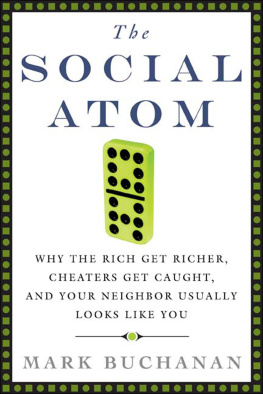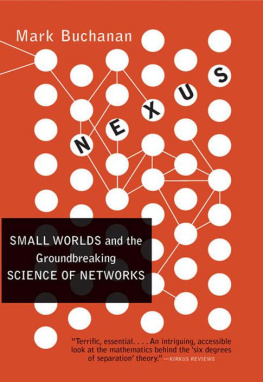The Social Atom
Nexus
Ubiquity
For Kate
Contents
There is nothing like a revolution, the British historian Edward Hallett Carr once said, to spark an interest in history. And nothing like a global economic crisis to stir wide interest in just what lies behind the mysterious turbulence of our financial markets and economic lives. Since the beginning of the financial crisis of 20072008, Ive read probably twenty or thirty books on the topic, many of them wonderfully informative as well as amusing and, of course, infuriatingMichael Lewiss The Big Short, John Lanchesters Whoops!, and Gillian Tetts Fools Gold, for example. These books all explore the nature of the global financial system, how it has changed in recent years, and how various (mis)incentives in the decade before the crisis led nations, financial institutions, and individuals to take on huge risks. These books also explored the psychological and institutional factors that kept almost everyone from seeing the looming disaster right up to the days before it finally unfolded.
In all these books, I felt one thing was missingan examination of the peculiar concepts of economic thinking, of the atmosphere of ideas of modern economic theory, which swayed many people to believe that the tumultuous history of economics and finance, a history of almost continual crises and disruption going back four hundred years, had somehow come to a miraculous end in our era because of the markets self-regulating nature and tendency towards equilibrium. Ive written this book to help fill this gap, and also to explore more constructive ideas for building a more realistic and more natural understanding of economic systems.
Economic theory today is highly mathematical, and economists have often been accused of having physics envy, of using imposing mathematics to give their field the same prestige and apparent certainty as one finds (sometimes) in physics and in other natural sciences. I think this is misleading. If economic theorists have tried to mimic physics, theyve only done so, I would argue, on a false and distorted view of physics. This book is an examination of how a more authentic use of some ideas and concepts coming from physics can be very helpful in putting our understanding of economic and financial systems on a more natural basis. Most certainly, they can help correct the dangerous view that markets are somehow inherently stable and self-regulating.
Many scientists have been generous with their help in refining the ideas in the following pages; Ive listed them in the Acknowledgments on .
Mark Buchanan
November 9, 2012
London, England
The Equilibrium Delusion
Economics is a discipline for quiet times. The profession, it turns out, has no grip on understanding how the abnormal grows out of the normal and what happens next, its practitioners like weather forecasters who dont understand storms.
Will Hutton, journalist
The Observer, London
I think physicists are the Peter Pans of the human race. They never grow up and they keep their curiosity.
Isidor Rabi, physicist
Like many towns sprawled across the great flat expanses of the midwestern United States, Overland Park, Kansas, is no stranger to extreme weather. Each year, in spring and early summer, warm, moist air sweeping in from the Gulf of Mexico slips under sheets of colder air tumbling in over the Rockies. Warm air rises, that banal phrase of folk physics, here takes on life: gravity drives vast plumes of the warmer, lighter air to penetrate the colder layer above and billow upward to a height of ten miles. This is the first ingredient in a recipe for atmospheric violence. The second is surface winds, blowing to the North and from the West, which drive this incipient protostorm to rotate like a turnstile. The resultseveral billion tons of wet, warm air whipped into an unstable, spinning towercreates near-perfect conditions for powerful tornadoes, some as much as a mile in diameter, with winds churning to 400 m.p.h.
To most of us, tornadoes seem freakish, unnatural, definitely abnormal. Yet the state of Kansas alone sees hundreds of them every year, and they come about through perfectly ordinary atmospheric processes. Broadly speaking, its all just part of what happens in the atmosphere: one event builds on another, and then another, and soon an ordinary gray sky becomes a violent, memorable twister. More technically, we could say the atmosphere is prone to what scientists call positive feedbacks, the consequences of which our human minds find hard to imagine.
Maybe youve heard the term elsewhere. Positive feedbacks are a longstanding concept in sciencethe process by which small variations in a given system can become increasingly large. They are commonplace in discussions of global warming. Melting glaciers turn white ice to blue water, reducing how much sunlight gets reflected back into the atmosphere; the process could accelerate planetary warming. Positive feedbacks arise in psychology, biology, electronics, physics, computer science, and many other disciplines. Yet even though many of us recognize this notion, we are dreadful when it comes to estimating its impact.
Take $1,000 and invest it in something that earns interest at a rate of, say, 10 percent each year. Leave it there for thirty years with the interest earned feeding back into the account. How much will you have? Well, 10 percent of $1,000 is $100, so you might think the amount should increase by $100 or so each year. Thirty years makes the total gain about $3,000, giving a total of $4,000. Of course, as the amount grows, youll be getting 10 percent of a growing number each year, so youd expect something a little more than $4,000. Maybe, without a calculator, youd guess $5,000 or $6,000? It already starts to feel hopeful to consider $10,000. But human intuition is no match for the mathematics. The actual total after thirty years is a little over $20,000. The amount feeds on itself and grows faster than anyone would expect.
Theres more here than a lesson about money; its a lesson in human thinking and why the world so often surprises us.
As humans, were terrible at imagining the likely consequences of positive feedback. Take a piece of paper and fold it, and then take that doubled paper and fold it again, and then again, thirty times in all. Actually, dont waste your time. Youll find you cant do it because the result, if you did, would be about seventy miles thick. Ask a friend to give you an apple today, two apples tomorrow, four the third day, and so on, for one whole month (thirty-one days). Youd better rent a large warehouse because on the final day alone youll get more than 2 billion apples. This is the power of positive feedback: each step not only makes things bigger, but also gears up the process itself, accelerating how fast things get bigger in a way that leads to consequences far beyond our expectations.
Positive feedback matters a lot more than we think, because in one form or another it lies behind almost everything that makes our world rich and surprising, changeable and dynamic, lively and unpredictable. It makes seeds sprout and grow into trees, matches burst into flame, and single cells divide and proliferate into living, thinking human beings. It drives political revolutions and new religions, and it makes perfectly peaceful blue skies give rise, with little warning, to storms of terrifying violence, like those tornado-spawning storms in Kansas. Our brains lack intuition for all this. In meteorology, and in the rest of science, its taken years of learning from mistakes to recognize how and why positive feedbacks play such a crucial role in causing events we might not otherwise expect.
Next page












